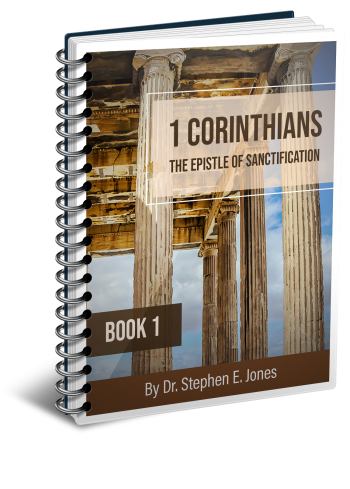Latest Posts
View the latest posts in an easy-to-read list format, with filtering options.

An in-depth commentary/study on the first 6 chapters of First Corinthians.
Category - Bible Commentaries

In 1 Corinthians 3:18, 19 Paul says,
18 Let no man deceive himself. If any man among you thinks that he is wise in this age, let him become foolish that he may become wise. 19 For the wisdom of this world is foolishness before God….
Here Paul begins to conclude his discussion about worldly wisdom and godly wisdom that began in 1 Cor. 1:19-25. It shows that the first three chapters of his letter form a complete package.
In summary, Paul asserts that godly wisdom is foolishness to the philosophers of worldly wisdom, even as worldly wisdom is foolishness to God. First and foremost on the list of foolishness is the practice of dividing up into schools of wisdom, each having students who follow the teachings of men, rather than God. Such division only leads to denominationalism, following the pattern of the Greek philosophical schools.
The root of the problem, Paul says, is that men are trained to think according to the soul’s logic and reason. Worldly wisdom is from the soul; God’s wisdom is from the spirit. When believers hear the voice of men (that is, their souls), they do what Israel did in demanding a man to be their king. God says, “they have rejected Me from being king over them” (1 Sam. 8:7).
From a biblical standpoint, this is the key problem of Pentecost that must be overcome. In fact, the baptism of the Holy Spirit (and fire) was designed to give the spirit of man access to the Holy Spirit in order to hear God’s voice and keep Christ as their King. It was designed to impart a level of discernment, so that believers could know the difference between hearing men and hearing God.
When believers are in submission to men, their souls are following the souls of their leaders. When believers are in submission to God (that is, the Holy Spirit), their spirits are following the spirits of leaders that hear and speak what the Holy Spirit says to the church. Paul says that the primary evidence of soulish leading is when men confess that they belong to Paul, Peter, or Apollos, rather than to Christ. Paul wanted no man to hear the voice of his soul, but to hear only the voice of his spirit insofar as it repeated what it had heard from the Holy Spirit.
In this way, we build the temple of God, not the temples of men. We build God’s Kingdom, not the kingdoms of men. We build the church, not church denominations. In the end, our work will be tested by the fire of God at the Great White Throne, even as the same fire of the Spirit tests our hearts today. Soulish works will be burned; spiritual works will endure. That which men did in obedience to men will be consumed; that which men did in obedience to God will survive.
Each believer is a temple of God, Paul says. Each one is inhabited by the presence of God and has the ability to hear His voice. Our main problem is discernment. We are often unable to discern and distinguish the two voices, one from the soul and the other from the spirit. Having been born from earthly parents who, like Adam, are “living souls,” we are used to hearing the voice of the inner soul, which is both mortal and carnal. We must be retrained to hear the inner voice of our spirit, for it alone has the ability to discern and appraise spiritual things and the wisdom of God.
So, Paul concludes, if anyone thinks he is wise in soulish wisdom, let him become foolish. Let him learn a new wisdom that appears foolish in the eyes of the men. Paul then supports his view by quoting two Scriptures. 1 Cor. 3:19, 20 says,
19 … For it is written [Job 5:13], “He is the One who catches the wise in their craftiness”; 20 and again [Psalm 94:11], “The Lord knows the reasonings of the wise, that they are useless [hevel, “breath, vanity,”].”
This is the only time that the New Testament quotes the book of Job. As for the quotation from Psalm 94:11, the psalmist says that the wisdom found in human reasoning is just hot air, so to speak. The Hebrew text reads hevel, which means “breath, vapor, vanity, emptiness.” This word is to be contrasted with ruach, “breath, spirit.”
Both hevel and ruach mean “breath,” but with vastly different connotations. If the psalmist had said that the soul’s worldly wisdom was ruach, he would have been espousing Greek understanding that the soul was spiritual. Instead, he says that soulish wisdom was hevel, something vain and empty. Job 7:16 uses the same word, saying, “my days are but a breath.” Speaking of the destruction of Jerusalem, Jeremiah says in Lam. 4:17, “Looking for help was useless.”
So Paul quotes Psalm 94:11 to support his contention that soulish wisdom was not spiritual. It was hevel, not ruach.
Paul ends this section with an admonition about boasting. 1 Cor. 3:21-23 says,
21 So then let no one boast in men. For all things belong to you, 22 whether Paul or Apollos or Cephas or the world or life or death or things present or things to come; all things belong to you, 23 and you belong to Christ; and Christ belongs to God.
Here Paul takes inventory of the things that belong to the children of God. Believers do not belong to the apostles; the apostles—all of them—belong to the believers. Paul, with his deep understanding of the law and the two covenants, belongs to all of the people. Apollos, with his knowledge of Scripture and eloquent teaching, belongs to all of the people. Cephas (Peter), with his personal experience in following Jesus, having seen His glory on the mount, belongs to all of the people.
To these we could add many others who have lived and died in later centuries, some of whom became founders of denominations. None of them were perfect, and none of them had a complete understanding of truth, but yet they brought truths to the church that were not understood earlier or restored lost truths. Luther is not owned exclusively by Lutherans. Wesley is not just for Methodists and Wesleyans. Parham and Seymour are not just for Pentecostals. Branham is not just for Branhamites. Hawtin is not just for Latter Rain people. All of these men are the inheritance of every believer who cares to lay claim to them as part of their spiritual inheritance.
By dividing the church into factions, we are all impoverished, for we cut ourselves off from other portions of our inheritance. Paul says in Eph. 4:8 that “when He ascended on high, He led captive a host of captives, and He gave gifts to men.” Paul explains those God-given gifts in Eph. 4:11, 12, saying,
11 And He gave some as apostles, and some as prophets, and some as evangelists, and some as pastors and teachers, 12 for the equipping of the saints for the work of service, to the building up of the body of Christ.
All who are called as ministers belong to the church (believers) as a whole. If they or their followers segregate themselves and lay exclusive claim to any of God’s gifts, it is a sign of soulish wisdom and the religious spirit of denominationalism. Likewise, when God raises up ministers and gives them a new revelation of truth, that truth cannot be copyrighted or patented by men or by denominations. Books and music may be copyrighted, although one must be careful not to restrict the spread of God’s word. On the other hand truth cannot be copyrighted, for it was freely given by the Spirit to the minister, and therefore it should be freely given to all who have ears to hear.
The spirit of denominationalism, also known as the religious spirit, is the first and foremost problem of the church in the Age of Pentecost. But the power of Pentecost was designed to overcome this religious spirit. True Pentecost brings the unity of the Spirit. Denominations are evidence of soulish dependence, where men follow the voice of men’s souls, rather than their enlightened spirits.
Unfortunately, history proves that Pentecost has largely failed. There remains, then, a third and final anointing through the feast of Tabernacles, which will succeed where Pentecost failed. This anointing will jump-start the Tabernacles Age that lies ahead. Those who are gifted with this great anointing will not establish denominations, but will minister to everyone freely according to his or her calling and gifting. They will steward all that is given them, knowing that in the big picture, we are all owned by Jesus Christ.